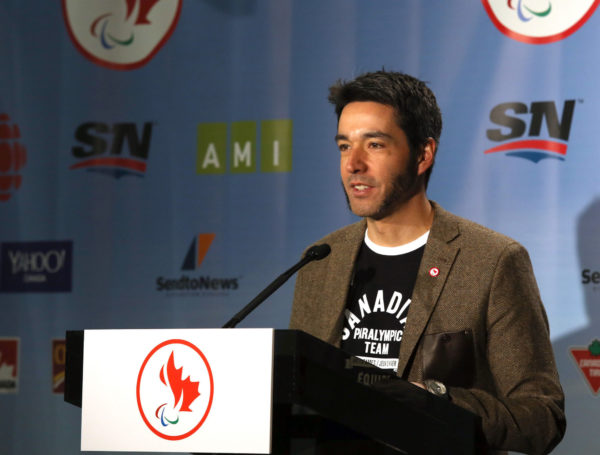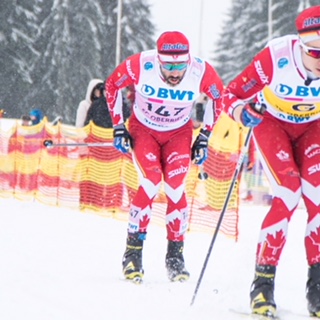May 10, 2018
Unfailing determination and supportive family help blaze trail to Olympic glory
Brian McKeever is Canada’s most decorated winter Paralympian. Since 2002, he has racked up 17 medals for Para-Nordic skiing during five trips to the Paralympic Games, including 14 gold. During his recent trip to PyeongChang, South Korea, he won three gold and two bronze medals. McKeever has overcome a unique challenge in achieving his unparalleled success. He has macular degeneration, a genetic condition resulting in the central loss of vision, which his father has as well. “I see the doughnut. I don’t see the Timbit,” he says jokingly, describing his vision. McKeever will be speaking at Edmonton Community Foundation’s (ECF) Annual Meeting on June 7, 2018 at the Westin Hotel downtown. In anticipation of his speaking engagement, ECF caught up with him after his latest Paralympic run to chat about how the relationship dynamics of his family strengthened throughout his athletic career, and how they have contributed to his success.
The following is an abridged version of the conversation that has been edited for space and clarity. You can find the whole interview on the upcoming June 2018 episode of ECF’s The Well-Endowed Podcast. If you would like to attend McKeever’s speaking engagement, please RSVP by June 4 by email at Annualmeeting@ecfoundation.org or by phone at 780.702.7628.

Edmonton Community Foundation: When did you decide to become a Para-athlete?
Brian McKeever: That’s a funny story. I never consciously made the decision. I’ve been a skier my whole life. I was moving up the ladder following in my brother’s (Robin McKeever) footsteps. Robin had qualified for the Olympics in ’98.
Then I had the diagnosis and part of the adjustment period was the knee-jerk reaction of, “Well, I’m never going to be able to do this. I won’t be able to ski like I did.” I was also going through mono at the time.
That spring I got sick, and if ever there was a time to quit, now would be the time. There seemed to be so many things conspiring against my career, but I loved the sport. I just kept skiing, kept racing, and then one day the head coach from the Paralympic team came and talked to me in Canmore and he asked if I had ever given any thought to joining their program.
I think I laughed at him, and said, “But I don’t have a disability.” He goes, “It’s not about having a disability. We all have disabilities, whether it’s physical, or whether it’s emotional, or whether it’s mental. Everybody has an issue. But if you’re classifiable as far as Paralympics goes, I want you in my program.” I’d never considered myself as having a disability, so I said to myself, “Well, I don’t have a disability so I’m not going to join this program.”
ECF: What made you change your mind?
BM: Robin and I were talking about it that night and we were laughing, saying, “You’re not disabled. Look at you. There’s nothing obviously wrong.” The more we talked about it the more I was thought, “Wait, it’s a chance to be on a national team program,” which is hard to get to on the able-bodied side. I was close, but this gave me the opportunity to get funding and be a professional skier right now. Not in two years from now.
It’s interesting looking back on it now because it would’ve been an easy thing to have brushed aside…and that would’ve been an opportunity missed. I’ve accomplished so much more in my career from having the support of the Para team than I would have ever done just on the able-bodied side.

ECF: It sounds like your brother was beside you through your journey. How has your family helped you along the way?
BM: The year [1998] that Robin went to the Olympics, I went to the World Junior Championships. That was really cool because at the trials races he was helping me test my skis. Then the next year he was testing my skis and he goes, “You know what? These just aren’t good enough. Here, you’re racing on my best skis today,” and he just gave me his.
That was a big moment because how could you give any more confidence to a racer than knowing that you’re on one of the best pairs of skis in the whole country? Skis play such a big role in what we do. Thanks to that and the confidence he gave me, I managed to qualify. He became a mentor to me.
ECF: How did Robin mentor you?
BM: I qualified for the Para Nordic team, and in my first races I was skiing alone with no guide. We get to the first races and there was a German guy who hadn’t lost in six years. I was 30 seconds behind him in this first race. Those guys said, “You know, if you had had a guide today you might have won because you’ve got that support. You got a draft the entire way. You might’ve skied 30 seconds faster. If you’re going to challenge in this sport you have to get a guide.”
My first thought was to call Robin. It’s tough because he also has his own career. For somebody to put that career aside for, whether it’s a few weeks, a year, or whether it’s full time, that’s a very difficult thing to ask of anybody. Yet, with Robin, he was more than willing to come and try it out.
ECF: How did this impact the relationship between you two?
BM: We became best friends and we became brothers for real. The best thing about that whole time period wasn’t the racing and the success we had but the fact that we reconnected on that level. That was all thanks to Parasport. In a way Parasport helped the family, but, you know, family sticks together pretty hard, and that was very evident in that sense that he was willing to put his career aside individually so that we could be a team.
ECF: How did your father’s experience with macular degeneration help you?
BM: I think we are the sum of our experiences. In our family it was totally normal. All the other kids, they would get into the car and go to the grocery store, and we’d get on bikes and do the same. When we were growing up, it was like, “Dad can’t drive. It’s fine. That’s just understood.”
The way he dealt with it was by almost ignoring it as being an issue. He grew up on a farm so stuff like that he just ignored, because did it really affect your life? You go out and you do the work. You make your life what it is.
ECF: How did you respond when you were diagnosed?
BM: We actually thought that both Robin and I had missed the gene, and then I started having trouble around 17. When the diagnosis hits it’s still a loss, even though you don’t know how bad it might be. I think no matter what, you have a knee-jerk reaction where you think it’s going to be so much worse than it really is. You think about all these ways that your life is going to change. That adjustment period and dealing with the emotional part of that loss is different for every person. In my case, it was made a lot easier because of the normalcy of it in my family.
I had a couple of weeks where I cried a lot and thought that my life was going to change so much. When I look back now, I realize that my life really hasn’t changed much at all. In the end it was a couple of weeks before I realized that I had to pull myself together and just start dealing with it the way my dad did.
ECF: You sometimes use the quote, “Get busy living, or get busy dying,” from The Shawshank Redemption. Why does that quote resonate with you?
BM: We only have one life, and you want to make the most of it and not regret things. To me that’s important because I live paycheque to paycheque in this job. It doesn’t pay much, and people are like, “Well, when is it time to retire and start having a real job?” While that starts to weigh heavily on me as I get older, I also know that I wouldn’t change anything at this point for what I’ve done and what I’ve been able to, what I’ve been allowed to achieve.
My life has been very rich because of the experiences I’ve had, the places I’ve gone, and the people that I’ve met. To me, that’s more important than any paycheque I could ever get.